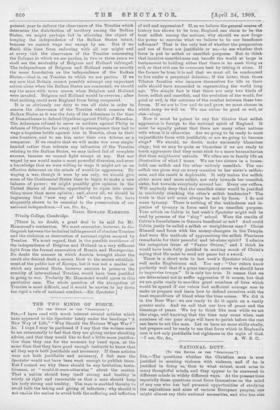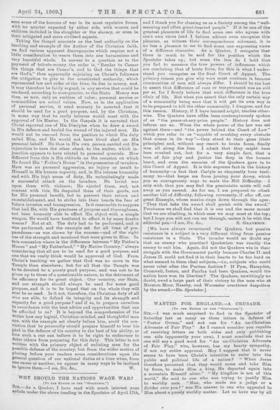NATIONAL DUTY.
[TO Tall EDITOR OF TIIIII .4 SPECTLT011....]
Sra,—The questions whether the Christian man is ever justified in meeting violence with violence, and if he is justified in doing so, then to what extent, must arise to marry thoughtful minds, and they appear to be answered to different minds in widely different ways. Al the present time especially these questions must force themselves on the mind of any one who has had personal opportunities of studying the aspirations and aims of various European peoples, one might almost say their national necessities, and who has also seen some of the horrors of war in its most repulsive forms, With no quarter expected by either side, with women and children included in the slaughter or the slavery, or even in their mitigated and more civilised aspects.
Taking the Gospel accounts as the best authority on the teaching and example of the Author of the Christian faith, we find various apparent discrepancies which require not a little consideration to weave them into one harmonious and very beautiful whole. In answer to a question as to the payment of tribute-money, the order is, " Render to Caesar the things that are Caesar's, and to God the things that are God's," thus apparently enjoining on Christ's followers the obligation to give to the constituted authority, which represented law and order at the time, its due in money, and, it may therefore be fairly argued, in any service that could bo rendered, according to emergencies, to the State. Money was then, as now, only an emblem of value; personal service or commodities are actual values. Now, as to the application of personal service, it need scarcely be asserted that it should be used for a good purpose, and, by the Christian, in some way that be really believes would meet with the approval of his Master. In the Gospels it is narrated that Christ reproved one of His Disciples when he drew a sword in Hie defence and healed the wound of the injured man. He Would not be rescued from the position to which His duty called Him, and He would not have blood shed on His personal behalf. He thus in His own person carried out His injunction to turn the other cheek to the smiter, which in- junction appears to have related to personal quarrels. How different from this is His attitude on the occasion on which He found His "Father's House" in the possession of invaders. Here was no personal aggression, no injury or insult to Himself in His human capacity, and, in His intense humanity and with His high sense of duty, He unhesitatingly made a' successful attack on the invaders. He levied war upon them with violence; He ejected them, and, not content with this, He despoiled them of their goods, not for His personal benefit, but to prevent their return and re-establishment, and to strike into their hearts the fear of fixture invasion and transgression. Is it reasonable to suppose that had He, with His greatness of purpose and thoroughness, not been humanly able to effect His object with a simple Weapon, He would have hesitated to effect it by more drastic means? Not at all. The duty bad to be performed, and it was performed, and the example set for all time of pre- paredness—as was shown by the success—and of the right use of the strength and manhood that were given to Him. In this connexion where is the difference between "My Father's House" and "My Fatherland," "My Native Country," always considering that all are to be used for a good purpose, and one that we really think would be approved of God. From Christ's teaching we gather that God was no more in the Temple than elsewhere; but for all that the Temple was to be devoted to a purely good purpose, and was not to be given up to those of a questionable nature, to the detriment of its efficiency for its great object. Our country, our State, and our strength should always be used for some good Purpose, and it is to be hoped that on the whole they will ever be so used. Is it not, therefore, the Christian duty of all who are able, to defend its integrity and its strength and Capacity for a good purpose P and if so, to prepare ourselves in accordance with the best advice and opportunities that can be afforded to us? It is beyond the comprehension of the Writer how any logical, Christian-minded, and thoughtful man cell, with the example set clearly before him, avoid the con- viction that be personally should prepare himself to bear his part in the defence of his country to the beet of his ability, or how such a one can believe it to be right to endeavour to deter others from preparing for this duty. This letter is not written with the primary object of enlisting men for the Possible defence of the country, but from the wider motive of Placing before your readers some considerations upon the general question of our national duties at a time when, from one cause or another, we appear in many ways to be inclined to ignore them.—I am, Sir, &a., W.























































 Previous page
Previous page